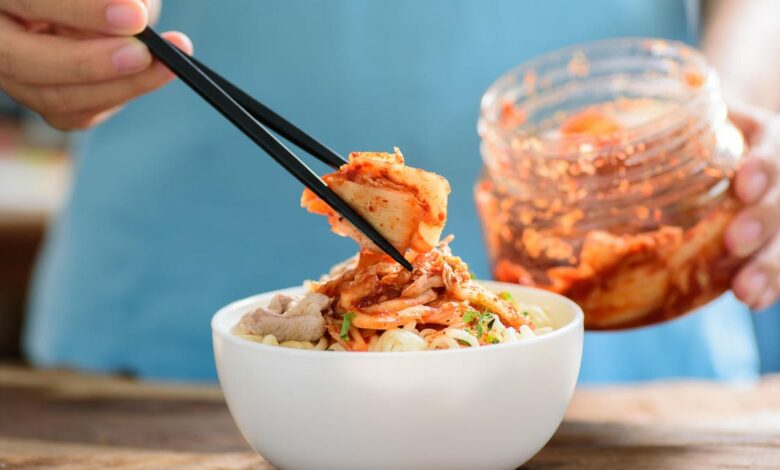Improve Your Gut Health Naturally With These 12 Probiotic Powerhouses


Gut health has been a hot topic lately. More and more people are realizing how important it is that what they digest affects their overall health. The state of your stomach can affect other bodily functions you might not realize, like your heart health and mental health.
Probiotics are a crucial element in much of the expert advice on gut health. These living microorganisms come in many forms, such as fermented foods or drinks, sourdough bread, Greek yogurt and more.
Ultimately, probiotics are lauded for promoting the growth of beneficial bacteria in your gut, which contributes to your digestive health, which in turn can reduce depression, improve mental health, promote heart health, strengthen your immune system, and give your skin a healthy glow. Good Gut Bacteria can also help promote a healthy metabolism, which can eliminate conditions such as obesity and diabetes.
If you’re on the hunt for a way to naturally improve your gut health, always consult your doctor first and consider this list as a good starting point for adding more probiotics to your diet. For more information, read more about why gut health is important and check out six natural remedies for an upset stomach.
What are the best probiotic foods for healthy gut flora?
If you’re looking to get more probiotics in your diet, here are 12 great probiotic foods. In addition to these foods, you can also try probiotic supplements. Look for labels that say “contains live cultures” or “contains active cultures” on these common probiotic foods.
1. Yogurt
A basic probiotic food, choose yogurt with live and active cultures. Some yogurts are even advertised to aid digestion or promote their probiotic content. Yogurt usually has L. acidophilus bacteriawhich can promote the growth of good bacteria in your gut. Yogurt is a great option because it is easy to find. You can buy any flavor that suits your preference and eat it straight from the package.
2. Kimchi
Kimchi is a traditional Korean side dish made by fermenting vegetables with probiotic lactic acid bacteria. Kimchi can give you that probiotic punch, especially with healthy ingredients like vegetables (usually Chinese cabbage, carrots, scallions, and radishes), garlic, red pepper powder, ginger, and other spices. It makes a delicious side dish and is traditionally served with steamed rice. Kimchi is associated with research related to anti-cancer, anti-obesity, colorectal health, cholesterol lowering, anti-aging, brain health, immune health, and skin health properties.

3. Pickles
You may be surprised to know that pickles may contain probiotics. Just make sure you buy fermented pickles, which are usually found in the refrigerated section of the health food aisle. Some brands even advertise probiotics. They fall under the term “healthy pickles,” but read the labels to make sure they contain probiotics. You can even make them at home. Some people also drink or use the juice that the pickles were fermented in. Be aware that jarred pickles are often high in sodium.
4. Sourdough
Sourdough starter contains lactic acid bacteria. The starter is the environment in which yeast and good bacteria grow by consuming water and flour. Natural prebiotics and probiotics are noted in research as one of the advantages of sourdough bread. It has also been linked to better blood glucose control, lower cholesterol, lower risk of diabetes, lower risk of heart disease and improved weight control. It also makes a pretty good sandwich bread.
5. Kefir
Kefir is a fermented milk made using kefir grains. It starts as regular cow or goat milk, and then a grain-like yeast and lactic acid bacteria colony called kefir is added to the milk. The mixture is fermented for about a day, and then the milk is filtered from the grains, creating the kefir drink. The resulting drink is a powerful probiotics which even contains more probiotics than yogurt.
6. Kombucha
Kombucha is a health drink that has made its way into the mainstream in recent years, meaning you can find it in the beverage aisle of major supermarkets. This drink is essentially a fermented tea, so you get the health benefits of tea with the probiotic boost of a fermented drink. It is made by adding bacterial strains, yeast, and sugar to black or green tea, which gives the drink its probiotic vibe. It ferments for about a week or more until a mushroom-like texture grows on top. The mushroom is filtered out to create new kombucha.
7. Sauerkraut
This German comfort food is fermented cabbage, made by lacto-fermenting the vegetable in its brine and a little salt. As part of the traditional fermentation process, probiotics are added the final product.
However, this is another product where you need to buy or make specific probiotic sauerkraut. Many brands use vinegar and sugar or are pasteurized, which reduces the growth of bacteria and kills probiotics. Regular canned sauerkraut is usually made with vinegar or is pasteurized (or both).
8. Miso soup
This Japanese dish is served with many meals. Miso is a paste usually made from fermented soybeans that is used as a flavoring for sauces, spreads, and broths. Miso soup uses this paste for its broth. Since miso is another fermented food, it contains the probiotic punchMiso soup is delicious with larger meals, but can also be eaten as a light lunch.
9. Apple cider vinegar
apple cider vinegar is twice fermented apple juice. Apple cider vinegar has been around for years as a popular health supplement. It contains natural probiotics from the fermentation process. Although the benefits further research neededMany people also use it for everything from soothing acid reflux to weight loss. It has a strong flavor, so if you don’t want to take it straight, add it to salad dressings, marinades, or pickling liquids.
10. A little cheese
Certain types of cheese contain probiotics. For example, old cheeses that are not heated then tend to take probiotics. Examples of these include Swiss, Gouda, cheddar, Edam, Gruyère, cottage cheese, and provolone. The good news is that many popular cheeses contain probiotics, including a healthy bowl of cottage cheese with some fruit added.
11. Pickled vegetables
Along the same lines as the kimchi and pickles above, you can also look into healthy pickled vegetables that specifically contain probiotics. One idea is to look into lacto-fermented escabeche, a Mexican pickle that can contain a wide variety of vegetables. Or you can make a fermented giardiniera, an Italian pickle relish. Using fermented pickles is also a great way to shop local and preserve vegetables for off-season use.
12. Buttermilk
Buttermilk may seem like a drink from “Little House on the Prairie,” but traditional buttermilk can be an excellent source of probiotics. Buttermilk includes several types of fermented dairy beverages, but traditional buttermilk is the liquid that’s skimmed off during the butter-making process. The trick is to avoid cultured buttermilk, which is the most common type found in grocery stores and usually doesn’t contain probiotics.




